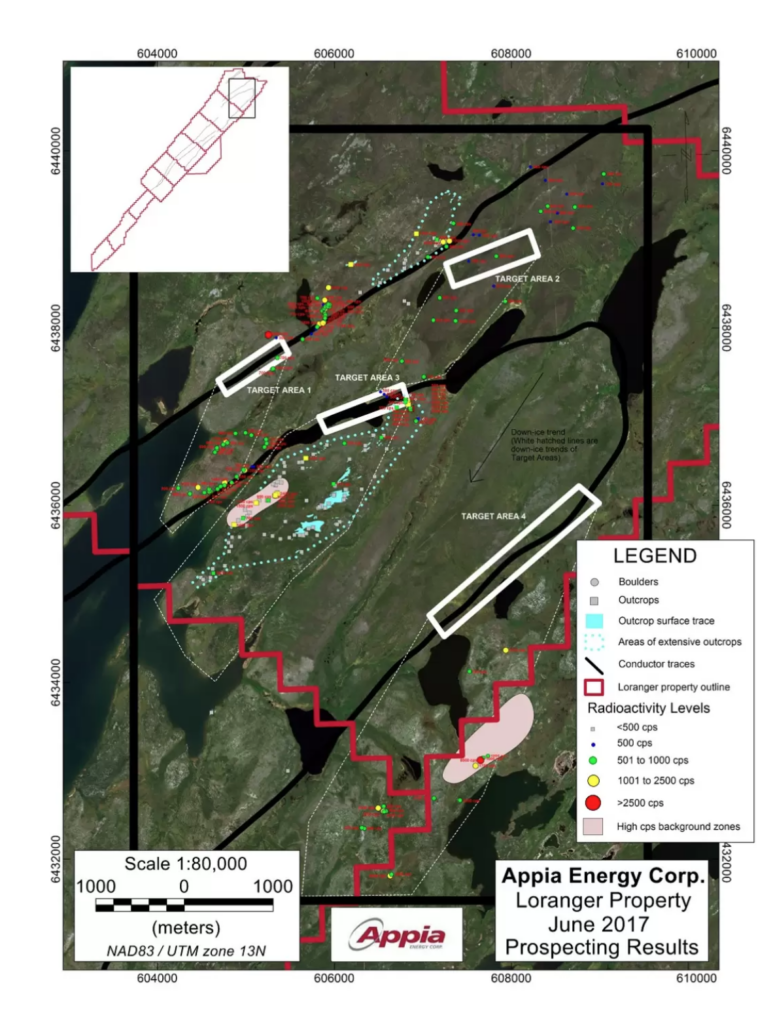Mr. Stephen Burega reports:
Toronto, Ontario–(Newsfile Corp. – July 26, 2017) – Appia Energy Corp. (CSE: API) (OTC: APAAF) (FSE: A0I) (MU: A0I) (BE: A0I) (the “Company or “Appia”) is pleased to announce the completion of a 117 km ground prospecting and radiometric surveying program (the “Program”) on the Company’s Loranger property (the “Property”), located 28 km southeast of Cameco’s Rabbit Lake mill, Athabasca Basin, northern Saskatchewan.
Four priority drill target areas and the down-ice trends of those areas were investigated for radioactivity, alteration and structure within boulders and outcrops. Background radioactivity ranged from 50 counts-per-second (“cps”) to 300 cps. Appia’s prospecting identified elevated radioactivity occurrences (2x to 10x background, i.e. >500 cps) in 154 individual boulders and outcrops with a range from 500 cps to 4,000 cps (producing an average of 1,000 cps), and one isolated occurrence up to 8,500 cps. Historic exploration results had only indicated 2 radiometric occurrences outside of the RCV drill area; each was a boulder measuring 400 cps.

Mr. James Sykes, Appia’s Vice-President Exploration & Development, comments: “The prospecting results are very encouraging in that we’ve identified far more radioactive occurrences than originally thought based on historic prospecting programs. Even more encouraging are the alterations and structure styles observed in some boulders and the discoveries of radioactive outcrops, some in conjunction with our drill target areas and others that present new exploration models. Even though the Program covered only a small fraction of the Property, it has helped refine and improve our geologic understanding of the Property, as well as outlining the potential for more radioactive discoveries with additional prospecting on the Loranger property.”
Alteration was only noted in boulders, not in outcrop, and accounted for less than 0.1% of all boulders observed in the field. The most common alteration styles were i) limonite and hematite stains (seven boulders produced radioactivity between 500 cps and 3,400 cps), ii) dark green pervasive alteration (not radioactive), and iii) quartz network breccia veining (a common alteration and structure observed as the most peripheral system to high-grade uranium deposits, not radioactive).
The Program also identified radioactive outcrops (500 — 4,000 cps) near drill target 2 and 3 areas, and a 650 m long by 150 m wide radioactive boulder train (500 — 2,400 cps) northeast of drill target 1 area. The boulders in the train are geologically similar to a radioactive outcrop identified 350 m northeast of the boulder train.
Attempts were made to sample some of the more radioactive boulders and outcrops but the source rocks were too rounded, hard and “welded” for hammer and chisel sampling to provide any sample size sufficient for geochemical analysis. Follow-up detailed prospecting and rock saw sampling programs are recommended for future exploration activities in some of the more anomalous and interesting areas.
The Program also determined that ground conditions for summer drilling of drill target areas is not feasible due to bogs and swamps preventing direct land access. Appia plans to wait for winter freeze-up and snow cover to provide ground accessibility for a winter drill program of the drill target areas. The Company remains well-funded to continue exploration on the Property. The drill is onsite and will be ready for a quick re-start as soon as winter ground conditions are favourable.
A handheld RS-125 Gamma-Ray Spectrometer/Scintillometer manufactured by Radiation Solutions was used to measure all natural gamma radiation in counts-per-second (“cps”) in the field. The reader is cautioned that Appia uses scintillometer readings only as a preliminary indication of the presence of radioactive materials (uranium, thorium and/or potassium), and that scintillometer results may not be used directly to quantify or qualify uranium concentrations of the rock samples measured.
Appia Energy Corp. will host a public webcast presentation on Friday August 04, 2017, from 1:40 PM — 2:10 PM as part of the John Tumazos Very Independent Research, LLC, Metals Conference on the Jersey Shore. You may access the presentation from http://wsw.com/webcast/vir16 or www.veryindependentresearch.com/confrerences. The presentation will be at the Greek Church Hall, 20 Hillcrest Road, Holmdel, NJ 07733. Contact John Tumazos for an invitation.
About Appia
Appia is a Canadian publicly-traded company in the uranium and rare earth sectors. The Company is currently focused on discovering high-grade uranium deposits in the prolific Athabasca Basin area on its Loranger, Otherside and Eastside properties, as well as high-grade REO and uranium surface showings on its Alces Lake joint venture. The company currently holds the surface rights to exploration for about 68,541 hectares (169,368 acres) in Saskatchewan.
The company also has NI 43-101 compliant resources of 8.0 M lbs U3O8 and 47.7 M lbs TREE Indicated and 20.1 M lbs U3O8 and 133.2 M lbs TREE Inferred in the Teasdale Zone plus 27.6 M lbs U3O8 Inferred in the Banana Lake Zone in the historic mining camp of Elliot Lake in Ontario (previously reported in the Company’s news release dated August 14, 2013). The resources are largely unconstrained along strike and down dip.
Appia currently has 52.3 million common shares outstanding, 65.3 million shares fully diluted.
The technical content concerning the Property in this news release was reviewed and approved by Thomas Skimming, P.Eng, a Director of Appia, and a Qualified Person as defined by National Instrument 43-101.




